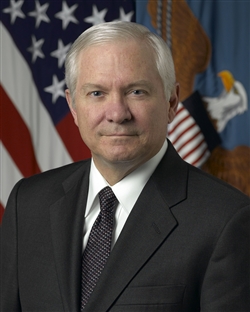
Robert Gates, Defense Secretary 2006-2011
Departing defense secretary Robert Gates is the 10th military chief I have covered since Harold Brown was running Jimmy Carter’s Pentagon. After a private dinner at the White House on Wednesday night, and a final ruffles and flourishes sendoff at the Pentagon on Thursday, Gates will fly off for his home in Washington state and never look back.
“He will once again try his hand at retirement,” Gates’ trusted spokesman, Geoff Morrell (who is leaving along with Gates), said Monday. “After a coupe of notable failures, he assures me he is determined to succeed this time.” If he succeeds as well in his retirement at his lakefront home as he did running the Pentagon since December 2006, his years to come should be golden.
Gates, 67, was a pragmatist who did more than speak the platitudes about the troops that all defense secretaries say. When he got into office, he was floored by the numbers of troops being killed by roadside bombs. Unlike his predecessor, Donald Rumsfeld, who seemed content to wage wars for years with ill-suited armor, Gates kicked the Pentagon bureaucracy in its ample behind. He got the military-industrial complex to produce 27,000 Mine-Resistant, Ambush Protected vehicles – for $45 billion — after USA Today reported on the lack of them.
When the Washington Post disclosed lousy living conditions for wounded troops at Walter Reed Army Medical Center, Gates made sure the Army secretary and the service’s top doctor were history. When the Air Force kept bungling its custody of nuclear weapons, Gates canned both the top Air Force civilian and officer — on the same day.
Gates went out of his way to acknowledge the role the press played in such cases, but he was always driven by concern for the troops. After all, the U.S. was at war during his entire tenure. “Your dedication, courage and skill have kept America safe even while bringing the war in Iraq to a successful conclusion and, I believe, at last turning the tide in Afghanistan,” he said in a final message to U.S. troops around the world Wednesday. It pained him to sign deployment orders sending more young Americans off to war. “This has weighed on me every day,” he added. “I have known about and felt your hardship, your difficulties, your sacrifice, more than you can possibly imagine.”
Gates’ mild Kansas twang masked his savviness. Many in the Air Force detested him – a former Air Force intelligence officer, no less! — after he shut down its prized F-22 production line well short of what Air Force leaders felt was needed to defend the nation. But his crafty deployment of threatened presidential vetoes ultimately carried the day. Even more importantly, he replaced the service’s fighter-jock culture with leaders less inclined to see everything through the crossed hairs of their cockpits’ heads-up-display, missiles primed to fire. (As for those vital F-22s? They’ve never been used in combat. And they’ve been grounded since May 3, barred from flying until a suspected problem with their oxygen system can be nailed down and fixed.)
You can judge Gates’ tenure by the flak he took from both the left and right. That makes sense: he was the only defense secretary to be asked to stay on by a newly-elected President – serving first as defense chief under Republican George W. Bush and then Democrat Barack Obama.
Liberals criticized him for talking tough on Pentagon spending, but doing little to curb the Building’s appetite. “Close analysis reveals that, for the most part, his actions did not match his rhetoric, that he does not deserve the accolades that are being heaped upon him as he retires and that he will leave [incoming defense secretary Leon] Panetta with more challenges than most realize,” says Larry Korb, a former high-ranking Pentagon official now at the Center for American Progress, a liberal-leaning think tank. Conservatives have bemoaned his warnings about additional capability the U.S. military needs – as if he hasn’t been running the place. “At a recent speech at AEI, Gates sounded more like an observer to the last four years as opposed to the man in charge of the entire United States military,” Mackenzie Eaglen, of the conservative Heritage Foundation, complained on Battleland recently.
But Gates was a student of the Cold War, and a spymaster for much of it – he spent 26 years at the CIA. He gets high marks for stewardship of the military on his watch because so many in that post haven’t been good stewards. He demanded accountability, which was bracing inside the Defense Department. Because he came in with a mandate to fix first Iraq, and then Afghanistan, it’s not fair to hold him to David Packard levels of management, or for failing to rebuild the Pentagon for the future. He bent it in the right direction, but there is much more that needs to be done.
The Pentagon, and the nation’s entire national-security establishment, is a tired old jalopy resting atop cinder blocks for someone – most likely a President with sufficient clout to push a sclerotic Congress to go along – to retool it for the military and economic challenges of the future. But doing that was never Gates’ mandate. His background predicted a sober, steady hand on the helm, and that’s what he delivered. He was perhaps the best 20th Century defense secretary we ever had, even if his time in the Pentagon’s E-ring was confined to the 21st Century.


